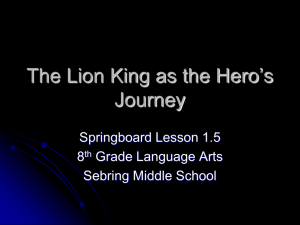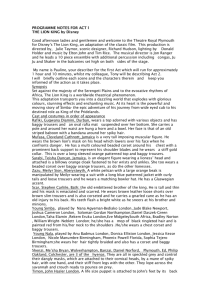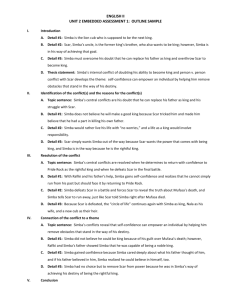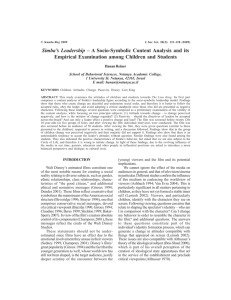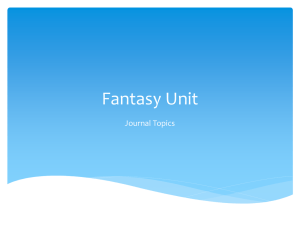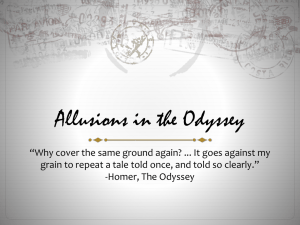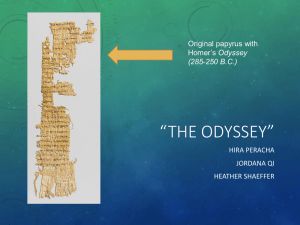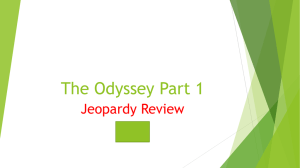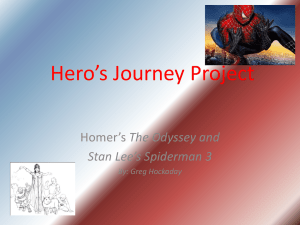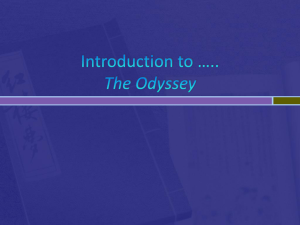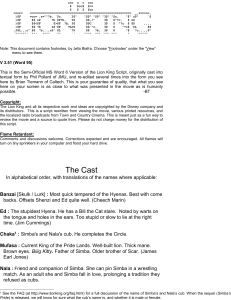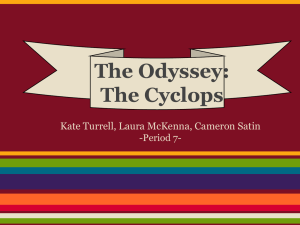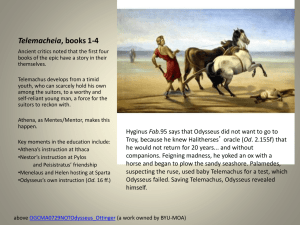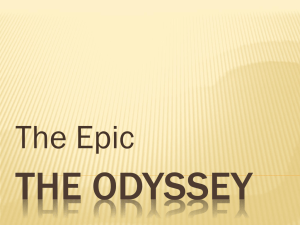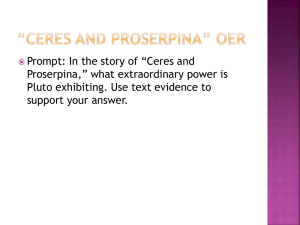The Hero*s Journey
advertisement
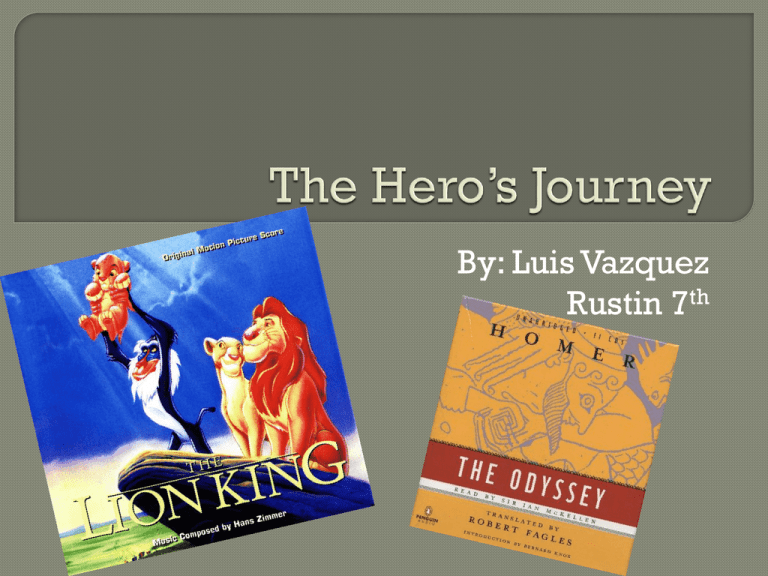
By: Luis Vazquez Rustin 7th The Hero’s journey is a cycle that is often found throughout many stories for both children and even Greek mythology. The Hero’s Journey consists of 3 main Stages, Including Departure, Initiation, and the Return. Many Sub Stages are found in each main category, today I will Connect two popular stories to a couple of these. Through the Odyssey written by Homer, and the Lion King by Walt Disney Movie Productions, these sub stages are commonly found. The Supernatural Aid in The Departure, The Atonement with the Father in the Initiation, and the Refusal of the Return in the Return, these examples flourished the most through both stories. DEPARTURE Supernatural Aid The Odyssey RETURN Refusal of the Return INITIATION Atonement with Father Odysseus had been trapped under the control of the goddess calypso, and only with the aid of an immortal would he be able to get away, “The strong god glittering left her as he spoke, and now her ladyship, had given heed to Zeus’s mandate… O Forlorn Man, be still. Here you need grieve no more; you need not fell you life consumed here; I have pondered it, and I shall help you go…” (Book 5, 4359). For Odysseus, the supernatural aid comes to help free him from being kept at Calypso’s island. Zeus, the king of Mt. Olympus, sends his messenger Hermes to convince Calypso of freeing Odysseus so he could return home. The force, not being directly physical in human opinions, is an example of the supernatural aid Zeus bestows upon him to continue his journey. After being sent down to the underworld by Circe, Odysseus would face his fate in hope to find remembrance, “Now hear the grace I pray for, in the name of those back in the world, not here- your wife and father, he who gave you bread in childhood , and your own child, your only son, Telemachus, long ago left at home” (Book 11, 40-44). Odysseus would venture into the underworld, following Circe's command, only to meet up a prophecy that affects his destination alltogether. Odysseus is faced to realize his forgotten father role through one of his deceased soldiers, telling him of his family mourning and their troubles. Throughout the journey, Odysseus had lost the sight of his father figure, only keeping his home in general in mind. The atonement with the Soldier gives him his epiphany of his previous figure. After a long and extraneous journey, Odysseus loses his eye for the main goal at each challenge he faces, “The sweet days of his life time were running out in anguish over his exile, for long ago the nymph had ceased to please. Though he fought shy of her and her desire, he lay with her each night” (Book 5, 47-51). Though a long and perilous journey that Odysseus had endured to reach his goal, the smothering of that original goal was always common. His need to return home was his immediate priority, yet through each challenge, it seems as if he settles down and sets it aside for his other wants. With Calypso, he is trapped at an island for over 10 years, he weeps daily for his fading memory of home yet he sleeps with calypso each night. Through the quote, the idea of his desire to return home is not his priority anymore, as he has given up with that fact, to only focus with his unnecessary wants. Departure: Supernatural Aid The Lion King Return: Refusal of the Return Initiation: Atonement with the Father In the Lion King, the Newborn king is presented to the animals of the kingdom as a sign of hope and reassurance, *The scene starts where Rafiki, the wise prophet of the animal kingdom (a baboon), raises Simba over a cliff as a cub, while the animals of the kingdom begin to cheer in praise of the newborn king. A light Shines down from the heavens landing on Simba, causing all animals to bow down at the sight* (The Lion King). The most depicted scene out of the entire movie, signifying the greatest points. A light from the heavens shines down on Simba, marking him, as the future key part of the Circle of Life. The supernatural essence shown gives the animals of the kingdom a sense of loyalty as they witness the ‘baptism’ of their future king. The supernatural force would begin to pave the way for Simba’s journey, as a baby cub, to his final destiny. After running away, Simba loses his way, only blinded by a Utopian society, requiring the force of a wise prophet to help him remember, “Simba: That’s not my father. That’s just my reflection. Rafiki: No… look harder. You see? He lives in you. Mufasa: Simba…Simba you have forgotten me Simba: No! How could I?! Mufasa: You have forgotten who you are so you have forgotten me, look inside yourself Simba. You are more than what you have become, you must take your place in the circle of life. Simba: How can I go back? I’m not who I used to be. Mufasa: Remember, who you are, your are my son, and the one true king…remember… *Rafiki hits Simba in the head* Simba: Ow! What was that for? Rafiki: Doesn’t matter! It’s in the past! … the past does hurt, what matters is that you can either run from it, or learn from it” (The Lion King). Thrown into a perilous run, the destiny of oneself can be easily avoided and forgotten, Simba had been visited by Nala, who failed to convince, but through Rafiki, he experiences a moment of his past and his remembrance of his father is climactic for the movie. With the aid of both Mufasa and Rafiki, Simba had been reminded of himself and his forgotten destiny. The restoration of oneself through a wise prophet or father figure is exactly what Simba had experienced, leading to his new born epiphany. The meeting of Simba and his best friend Nala is a dramatic meeting, at which they both face the fact of simba’s blinding of reality, “Nala: What else matters, your alive! And that means you’re the king… Pumba: Your majesty, I gravel at your feet! Simba: Stop it! Timone: it’s not gravel, its grovel. And don’t, he’s not the king…Are ya?” Simba: No! Nala: Simba! Simba: No. I’m not the king; maybe I was gunna be, but that was a long time ago” (The Lion King). Through their dramatic reacquaintance, Nala is astounded with the sight of her long lost king and best friend. Simba, however through the scarring events and his new way of mind, “Hakuna Matata”, Simba’s opinion of being king no longer appeals to him as it did as a cub. He had set forth to live as an outcast, due to which his kingdom thought he was killed in a tragic incident. Simba has been blinded with a Utopian setting, in lieu of his destiny. The Odyssey: Homer Homer, , and Robert Fitzgerald. The Odyssey. Garden City, N.Y: Anchor Press/Doubleday, 1961. Print. The Lion King: Walt Disney Movie Productions The Lion King (A Walt Disney Masterpiece) [VHS]. Dir. Rob Minkoff. Perf. Matthew Broderick, Jeremy Irons, James Earl Jones. Walt Disney Home Video, 1995. VHS. "THEOI GREEK MYTHOLOGY, Exploring Mythology & the Greek Gods in Classical Literature & Art."THEOI GREEK MYTHOLOGY, Exploring Mythology & the Greek Gods in Classical Literature & Art. N.p., n.d. Web. 10 Feb. 2011. <http://www.theoi.com/>. (Pictures taken from this site)
